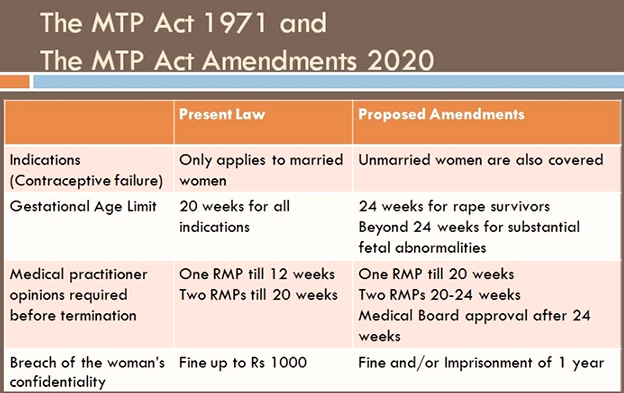Social Justice
Medical Termination of Pregnancy (Amendment) Bill, 2020
- 19 Mar 2021
- 6 min read
Why in News
Recently, the Rajya Sabha passed the Medical Termination of Pregnancy (Amendment) Bill, 2020. The Bill was passed in the Lok Sabha in March 2020.
- The Bill seeks to amend the Medical Termination of Pregnancy Act, 1971.
Key Points
- Provisions:
- Termination due to Failure of Contraceptive Method or Device:
- Under the Act, a pregnancy may be terminated up to 20 weeks by a married woman in the case of failure of contraceptive method or device. The Bill allows unmarried women to also terminate a pregnancy for this reason.
- Opinion Needed for Termination of Pregnancy:
- Opinion of one registered medical practitioner (instead of two or more) for termination of pregnancy up to 20 weeks of gestation .
- Gestation is the foetal development period from the time of conception until birth.
- Opinion of two registered medical practitioners for termination of pregnancy of 20-24 weeks of gestation.
- Opinion of the State-level medical board is essential for a pregnancy to be terminated after 24 weeks in case of substantial foetal abnormalities.
- Opinion of one registered medical practitioner (instead of two or more) for termination of pregnancy up to 20 weeks of gestation .
- Medical Boards:
- Every state government is required to constitute a Medical Board.
- These Medical Boards will consist of the following members: (i) a gynaecologist, (ii) a paediatrician, (iii) a radiologist or sonologist, and (iv) any other number of members, as may be notified by the state government.
- Upper Gestation Limit for Special Categories:
- It enhances the upper gestation limit from 20 to 24 weeks for special categories of women which will be defined in the amendments to the MTP Rules and would include survivors of rape, victims of incest and other vulnerable women (like differently-abled women, minors) etc.
- Confidentiality:
- The “name and other particulars of a woman whose pregnancy has been terminated shall not be revealed”, except to a person authorised in any law that is currently in force.
- Termination due to Failure of Contraceptive Method or Device:
Note
- Before 1971, abortion was criminalized under Section 312 of the Indian Penal Code, 1860, describing it as intentionally 'causing miscarriage'.
- Benefits:
- Termination in Case of Anomaly:
- A number of foetus abnormalities are detected after the 20th week, often turning a wanted pregnancy into an unwanted one.
- Helps Special Category Women:
- The law will help the rape victims, ill and under-age women to terminate the unwanted pregnancy lawfully.
- Beneficial for Unmarried Women:
- The Bill also applies to unmarried women and therefore, relaxes one of the regressive clauses of the 1971 Act, i.e., single women couldn’t cite contraceptive failure as a reason for seeking an abortion.
- Allowing unmarried women to medically terminate pregnancies and a provision to protect the privacy of the person seeking an abortion will bestow reproductive rights to the women.
- Termination in Case of Anomaly:
- Challenges:
- Viability of the Foetus:
- A key aspect of the legality governing abortions has always been the ‘viability’ of the foetus.
- Viability implies the period from which a foetus is capable of living outside the womb.
- As technology improves, with infrastructure up-gradation, and with skilful professionals driving medical care, this ‘viability’ naturally improves.
- Currently, viability is usually placed at about seven months (28 weeks) but may occur earlier, even at 24 weeks.
- Thus, late termination of pregnancy may get in conflict with the viability of the foetus.
- A key aspect of the legality governing abortions has always been the ‘viability’ of the foetus.
- Preference for a Male Child:
- The preference for a male child keeps sex determination centres in business in spite of their illegal status. There are concerns that a more liberal abortion law can aggravate this state-of-affairs.
- Change of Choice:
- The current Bill does not consider factors such as personal choice, a sudden change in circumstances (due to separation from or death of a partner), and domestic violence.
- Medical Boards:
- The present healthcare budgetary allocation makes setting up a board across the country, both financially and practically impossible.
- Access to the board by pregnant women in remote areas of the state is a matter of concern.
- No time limit set to respond to the requests.
- The board will subject women to multiple examinations before allowing her to terminate her pregnancy. This is a violation of right to privacy and right to live with dignity.
- Viability of the Foetus:
Way Forward
- Though Medical Termination of Pregnancy (Amendment) Bill, 2020 is a step in the right direction, the government needs to ensure that all norms and standardised protocols in clinical practice to facilitate abortions are followed in health care institutions across the country.
- Along with that, the question of abortion needs to be decided on the basis of human rights, the principles of solid science, and in step with advancements in technology.





